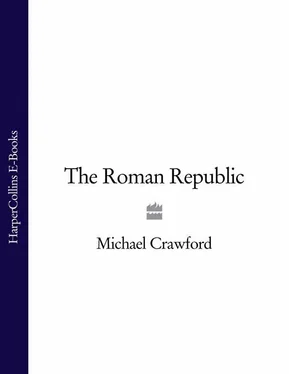Michael Crawford - The Roman Republic
Здесь есть возможность читать онлайн «Michael Crawford - The Roman Republic» — ознакомительный отрывок электронной книги совершенно бесплатно, а после прочтения отрывка купить полную версию. В некоторых случаях можно слушать аудио, скачать через торрент в формате fb2 и присутствует краткое содержание. Жанр: unrecognised, на английском языке. Описание произведения, (предисловие) а так же отзывы посетителей доступны на портале библиотеки ЛибКат.
- Название:The Roman Republic
- Автор:
- Жанр:
- Год:неизвестен
- ISBN:нет данных
- Рейтинг книги:4 / 5. Голосов: 1
-
Избранное:Добавить в избранное
- Отзывы:
-
Ваша оценка:
- 80
- 1
- 2
- 3
- 4
- 5
The Roman Republic: краткое содержание, описание и аннотация
Предлагаем к чтению аннотацию, описание, краткое содержание или предисловие (зависит от того, что написал сам автор книги «The Roman Republic»). Если вы не нашли необходимую информацию о книге — напишите в комментариях, мы постараемся отыскать её.
The Roman Republic — читать онлайн ознакомительный отрывок
Ниже представлен текст книги, разбитый по страницам. Система сохранения места последней прочитанной страницы, позволяет с удобством читать онлайн бесплатно книгу «The Roman Republic», без необходимости каждый раз заново искать на чём Вы остановились. Поставьте закладку, и сможете в любой момент перейти на страницу, на которой закончили чтение.
Интервал:
Закладка:
In the history of the Republic, appeal was made to the concepts of libertas and dignitas both by those who sought to introduce radical change, notably by appealing to popular opinion against aristocratic consensus and by attempting to increase the material privileges of the people, and by those who sought to preserve the status quo , both in terms of political power and in terms of the distribution of resources.
The struggles between politicians during the Republic were given free rein by the failure to develop communal institutions for the maintenance of order; thus even legal procedure often involved the use of an element of self-help, as in bringing a defendant to court. Such a state of affairs perhaps did not matter greatly in a small rural community, and the struggle of the Orders, between patricians and plebeians, was in the end resolved in the course of the fifth and fourth centuries BC. But when men turned to force in the late Republic to resolve political differences, the result was catastrophic, with armies composed of many legions rapidly involved.
Secondly, I should like to stress the innovativeness of the governing class of the Republic in a wide variety of fields, cultural as well as political. If one looks at the two centuries between the Second Punic War and the age of Cicero, the impression is of an enthusiastic borrowing of Greek artistic and intellectual skills, slowly leading to the emergence of a developed Latin culture; the central period of Hellenization of the Roman oligarchy was precisely the period when it was locked in escalating internal competition which finally destroyed the system.
Finally, I have attempted to illustrate how the sources for a particular event often adopt, consciously or unconsciously, a polemical approach and how the development of this polemic is itself part of Republican history. The sources for the history of the Republic, indeed, leave much to be desired; the works of Roman and Greek historians contemporary with the events which they chronicled have largely perished; so too have most official records; even the works of later historians who reproduced and reshaped the material in earlier historians and in official records are rarely complete. But our inadequate knowledge of what happened is partly compensated for by the possibility of observing something of how the Romans saw their past and how that vision affected their conduct.
I The Sources
IT WAS NOT UNTIL the end of the third century BC that any interest in the writing of history manifested itself at Rome; this interest was the result of an awareness that Rome was or was becoming part of the civilized world, that is the Greek world, surrounded by states of great antiquity and with a long and glorious history. A similar pedigree was a vital necessity for Rome. Within a few years of each other, Q. Fabius Pictor, a member of the Roman nobility, set out to write in Greek a history of Rome; Cn. Naevius, a poet from Campania, composed in Latin an epic poem on the First Punic War which included a great deal of material on early Roman history; and the family of L. Cornelius Scipio Barbatus, who died about 280 BC, inscribed on his sarcophagus an account of his career in nearly four lines instead of a simple line-and-a-bit giving his names and titles (See Pl.1).
From this point onwards there is a rich Roman historical tradition, albeit now very imperfectly preserved. Beside this tradition there is another, that of Greek historians observing Rome from the outside. The Roman tradition has certain unifying characteristics; Pictor removed history from the hands of the official priests who had been responsible for most of such records as had been kept, but since the official priests of Rome were drawn from its aristocracy and were more officials than priests he did not change its essential nature. History at Rome was almost always written at least unconsciously from an aristocratic viewpoint and was often consciously apologetic. It shows a strong tendency to simplify the dilemmas of the past; and particularly in the late Republic it tends to see the antecedents of the revolution in purely moral terms, with evil men subverting the efforts of the heroic defenders of the res publica.
The Greek tradition is perhaps more complex. With Rome’s confrontation with and defeat of King Pyrrhus of Epirus (Map 3) in 275 and the consequent abandonment of his attempt to create an empire in the west, the Greek world began to take notice, even if Rome remained unconscious of the significance of what she had achieved. The first serious Greek historian of Rome was Timaeus. Born in Tauromenium (Taormina) and exiled as a young man by King Agathocles of Syracuse (Map 2), he spent his working life in Athens, some fifty years in all; but his interest in the west remained and led him to write a history of Sicily and a history of Pyrrhus. The contemporary defeat of a Hellenistic king by a republic may have been a congenial theme to a man exiled by a tyrant and attested as an opponent of divine honours for kings. At all events, Timaeus was led to a serious investigation of the new power in the west; and it is not surprising that Polybius in his wish to establish himself a century later as the historian of Rome should have devoted so much energy to attacking the credentials of Timaeus.
We are told that Timaeus narrated the early history of Rome and the Pyrrhic War; but he went beyond merely accounting for the existence of the power which had defeated Pyrrhus. He questioned native informants about the Roman sacra at Lavinium (Map 1); he knew of the curious Roman customs relating to the sacrifice of the October horse; he wrote of the origins of the Roman monetary system and census classes; he synchronized the foundation of Rome with that of Carthage and thus knew, unlike all his fellow Greeks hitherto, that a long period intervened between the arrival of the Trojans in Italy and the foundation of Rome.
Timaeus lived to record only the first serious encounter of Rome with a Greek state; a century later Polybius of Megalopolis (Map 3) was stimulated to record the defeat by Rome not only of Carthage in the First and Second Punic Wars, but also of one Greek state after another and the consequent emergence of Rome as the dominant power in the Mediterranean. Unlike Timaeus, Polybius was an active politician, involved as a young man in the affairs of a Greek community, the Achaean League, which was allied with Rome in the early second century BC and whose leading city, Corinth, was eventually sacked by Rome in 146. Polybius, interned by Rome as a man whose allegiance was doubtful in 167, on balance approved of the Roman victory of 146. He had in any case already established a number of close friendships with members of the Roman aristocracy and his picture of Rome is hardly that of a complete outsider ( see here).
The last great Greek historian of Rome is Posidonius; contemporary with and a friend of many of the great men of the late Republic, he wrote, apart from numerous works on philosophy, science and geography, a history of Rome carrying on from where Polybius ended, the destruction of Carthage and Corinth in 146. An admirer of traditional Roman values and contemptuous of Rome’s declared enemies in the Greek east, he nonetheless devoted much space to internal stress at Rome and commented on her often deplorable approach to provincial government.
Of all the historians of Rome writing before the death of Caesar no work is now preserved complete. The histories of Polybius have fared best, but of the other Greek historians and of all the Roman historians only miserable fragments have survived in quotation by later authors, often grammarians interested primarily in rare word forms. Their works, however, lie behind and are often directly used in the histories of two men writing under the principate of Augustus, the Greek Dionysius of Halicarnassus (Bodrum) and the Roman T. Livius of Patavium (Padua). The ‘Early history of Rome’ by Dionysius covered the period down to the beginning of the First Punic War and is preserved complete down to 444–3, thereafter in excerpts; the ‘History of Rome from its foundation’ by Livy covered the period down to the defeat of Varus in Germany in AD 9 and is preserved complete down to 293 (Books 1–x) and from 218 to 167 (Books XXI–XLV), otherwise in resumes made for the semi-literate reading public of the later Roman empire, in the works of later historians and compilers of collections of exempla , moral tales, and in occasional quotations in extenso.
Читать дальшеИнтервал:
Закладка:
Похожие книги на «The Roman Republic»
Представляем Вашему вниманию похожие книги на «The Roman Republic» списком для выбора. Мы отобрали схожую по названию и смыслу литературу в надежде предоставить читателям больше вариантов отыскать новые, интересные, ещё непрочитанные произведения.
Обсуждение, отзывы о книге «The Roman Republic» и просто собственные мнения читателей. Оставьте ваши комментарии, напишите, что Вы думаете о произведении, его смысле или главных героях. Укажите что конкретно понравилось, а что нет, и почему Вы так считаете.












